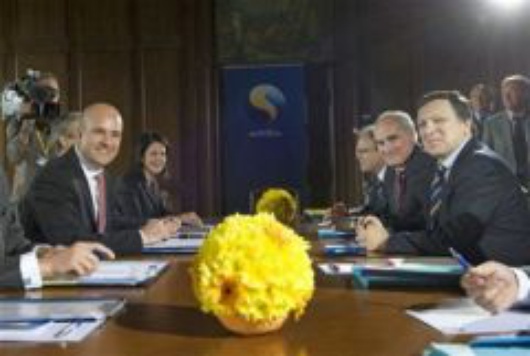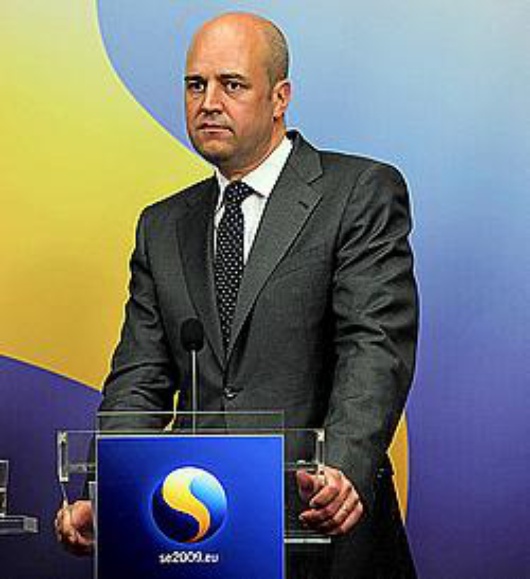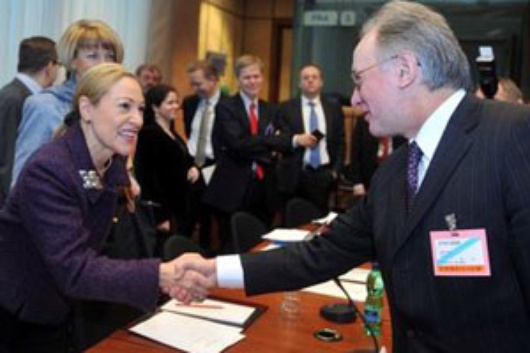
Swedish EU Council Presidency and Belarus: The Challenge has been taken.
Published on
© Grundig, Minsk Cafe Babel It’s been eight years since Sweden’s last EU Presidency in 2001. Many things have happened over this time: EU eastwards enlargement, the Constitutional Treaty (Lisbon treaty) was rejected twice, EU plunged into a serious institutional crisis coping along with the ongoing financial crisis.
These issues, among others, are the ones that are tackled by the Swedish Presidency from July 1 to December 31, 2009.
Ambitions of the Swedish EU Presidency largely reflect the ambitions of Sweden itself – to consolidate and enhance the role of Sweden as a European and global leader. No doubt, internal EU problems are far more important than external policy investment with, often, unpredictable result. It is therefore that the Swedish presidency places its attention on fighting unemployment, creating favourable conditions for small and medium enterprises, resolving the institutional stalemate, developing intellectual and effective approaches to climate and coping with other challenges of the nowadays Europe. It is because of these issues that the presidency’s slogan became “taking on the challenges”.
On the foreign policy field, however, the Swedish EU Presidency has clear ambitions. The way to fulfill these ambitions is starting discussion on the Baltic Sea Strategy, Eastern Partnership implementation process, future cooperation on the issues of EU justice and home affairs (such as immigration, border security, asylum, etc.) as well as further enlargement negotiations with candidate countries.
Defining foreign policy vectors
 It is rather obvious that today, in time of institutional and economic turmoil, EU places more emphasis on sorting domestic policy priority zones. This is probably why the articulated priorities of the Swedish presidency are climate and employment.
It is rather obvious that today, in time of institutional and economic turmoil, EU places more emphasis on sorting domestic policy priority zones. This is probably why the articulated priorities of the Swedish presidency are climate and employment.
Photo www.montgomerycrossing.com
However, global leadership ambitions of Sweden are related specifically to the management of foreign policy tasks and building relationship with Belarus gives Sweden a chanсe to strengthen its positions as a global and regional efficiency-oriented player.
A number of political scientists have claimed that Belarus should be approached directly, i.e. without Russia as a middleman. However, Swedes seem to be more pragmatic and state their readiness to work with both, the “unpredictable government of Belarus” and Russia, which looks at the initiative as an attempt to intervene into its sphere of influence. At the end of July, Belarus’ Minister of Foreign Affairs Sergei Martynov upon his return from Brussels claimed that the main partners for Belarus in foreign policy remain the EU and Russia, confirming solidity of Belarus’ foreign policy and indicating at the employment of mediator opportunities of Belarus.
Foreign policy priorities of the Swedish presidency are in general strongly oriented eastwards and towards Russia specifically. The reason for that could be,- quoting Nicu Popescu of the European Council on Foreign Relations,- the fact that “many problems in EU-Russia relations are in Russia’s Neighbourhood states”. It could be the reason why the Swedish Presidency’s Working Programme looks at the relations with Russia through the prism of initiatives in its neighouring countries.
One of such initiatives envisages broad plans on expanding the energy community and energy cooperation, which includes, among others, Ukraine and Moldova in the framework for creating eco-effective EU economy – one of Presidency’s priorities. Belarus is not on the energy community list, but the country takes part in energy and transport projects of the Baltic-Black Sea region. According to the Ukrainian Foreign Ministry, the head of the Ministry, Mr. Ogryzko claimed readiness to transport electricity to Lithuania through Belarus (implementation of this project is envisaged by the Strategic Partnership Development between Ukraine and Lithuania for 2009-2010). As a result, consultations have already been carried out among the experts of the three states. Considering that one of the priorities of the Swedish EU presidency is aid in developing socio-economic potential and competitiveness of the Baltic region, Belarus is likely to be included into this EU macro-regional project as a partner. Other than that, Belarus has got the observer status at the Council of Baltic Sea States. This way it looks like the prospects of including Belarus into the European projects are real and predictable.
Is Belarus ready to accept the challenges?
These are, however, the prospects of EU-Belarus cooperation in economic issues that require a feedback from Belarus in normative issues,- as the place for Belarus in Europe is equally determined by its attitude towards norms and rights. The institute that fosters EU norms – the Council of Europe – may still to or may have already become the central organ regulating economic-normative EU-Belarus relations. According to the Council of Europe Parliamentary Assembly (PACE) Information Office, June 29 2009 (that is, after the PACE’s request not to cancel the decision on the suspension of death penalty), yet another death sentence has been articulated to a young person in Belarus.
 It is therefore likely that the Swedish Presidency will use PACE as a pressure instrument and to regularly remind of a number of normative conditions Belarus has to fulfill. Prosperity entourage might well result from the necessity to downplay negative ramifications of the financial and economic crisis in the country. However, the overall deterioration of socio-economic indicators should motivate the authorities to undertake concrete measure to liberalise its policy. The normative-rational dichotomy in EU-Belarus relations that was mentioned in one of the earlier articles may well be seen the best during the Swedish EU Presidency. The 2001 Swedish presidency experience shows as a serious position of Sweden in questions of democracy, human rights, the rule of law as well as strengthening the rights theme in the EU agenda.
It is therefore likely that the Swedish Presidency will use PACE as a pressure instrument and to regularly remind of a number of normative conditions Belarus has to fulfill. Prosperity entourage might well result from the necessity to downplay negative ramifications of the financial and economic crisis in the country. However, the overall deterioration of socio-economic indicators should motivate the authorities to undertake concrete measure to liberalise its policy. The normative-rational dichotomy in EU-Belarus relations that was mentioned in one of the earlier articles may well be seen the best during the Swedish EU Presidency. The 2001 Swedish presidency experience shows as a serious position of Sweden in questions of democracy, human rights, the rule of law as well as strengthening the rights theme in the EU agenda.
Photo www.chas-daily.com
“Society is what is created by people, not what is given top down”, - said Prime Minister of Sweden and the Head of the Swedish EU Presidency Mr. Fredrik Reinfeldt. The phrase, understood by any EU citizen, implies the genuine attitude towards the creative and, most importantly, initiating role of society in building democratic institutes. Belarus does not possess such experience and this could be what makes Belarus “unpredictable”. However, once the Belarusians and the Belarusian authorities have the necessary demand, EU could become a new ideological navigator for the country. Time should show whether Belarusians are ripe for the power of will.
Swedish EU Council Presidency as a tool for normative oversight
The Swedish EU presidency is not just fostering the Swedish vision of the European construction; it is about fostering the Swedish approach to Europe and the Union. Multilateral cooperation within the Eastern Partnership gives an opportunity for Swedes to lobby their (both Swedish and European) interests in the politico-economic spheres most sensitive for the post-Soviet states. The spheres are good governance, sustainable development, human rights and fundamental freedoms, market economy and international law, etc. As Belarus binds itself with the obligation to participate in the Eastern Partnership initiative, whose basic principles are the ones mentioned above, it inevitably becomes subjected to the economic and normative oversight on the part of the Swedish and the forthcoming presidencies of the EU. It is interesting to note that in the Prague Eastern Partnership Summit Declaration, stability, security and prosperity of the EU’s partners in this initiative are bound to commitments of the partner countries (including Belarus) to carry our political and socio-economic reforms. EU, in its turn, is willing to help.
Another ambitious EP initiative is the Parliamentary Assembly European Neighbourhood East (EURONEST) within the Eastern Partnership. The initiative aims at holding a summit of parliamentarians (60 MEPs and 10 representatives from each partner country) this autumn for discussing and analyzing the projects within the Eastern Partnership frame. Considering that the Belarusian Parliament has not been recognized by the EP or the EU, Belarus has been claimed to be represented by the democratic forces of the country. The fact that Belarus will be represented by human rights and non-governmental organization at the Summit for obvious reasons does not please Belarusian officials. EU’s attempt ‘to form Belarus agenda building on the opposition requirements’ already caused indignation of the Belarusian leader. The Belarusian President has warned the EU against “unlikely prospects’ of such cooperation. Yet, Swedish presidency’s priorities and interests in this initiative, the country’s authority as a normative power, and finally the power of co-decision may push Belarus towards a more compromise-based rhetoric.
Belarus opts out of Euroskeptics

Photo www.euroradio.fm
The result of the EU Troika – Belarus meeting on July 28, 2009 indicates at Belarus’ cautious commitment to the European way of navigation in economic and political issues. In particular, Belarus, as represented by Minister Martynov, articulated its wish for a “closer” and “result-oriented cooperation in a number of fields, of interest to Belarus. These are the visa regime, the change of the most favoured status regime for a “different regime. What is “closer” and “result-oriented” cooperation, and what “different regime” the Minister referred to, remains unknown. When answering the question of the Swedish News Agency whether the Minister thought Belarus could meet the expectations concerning reforms on human rights, freedom of expression and so on that Mr Bildt and Ms. Ferrero-Waldner have spoken about until November so that new steps could be taken in the relations between Belarus and the European Union, the Minister replied that Belarus reasonably expected that [Belarus] would be “in a position to provide the necessary grants for the European Union to take the decisions which are important[1].
Whether “providing the necessary grants” means creating conditions or guarantees for normative and legal reforms until November or resolving substantive political issues, is unknown. However, the fact of gradual, careful, yet conscious geopolitical U-turn is obvious.
Conclusions
The prospects of the normative oversight on the part of the European Union and the Swedish Presidency, to my mind, pushes Belarus to open compromise-based and blunt Euroatlantic rhetoric in relations with the EU. On July 22, Belarus’ MFA Deputy Alexander Lukashevich noted that entering South Osetia and Abkhazia from regions other than Zugdidi and Gori (Georgia) is forbidden. Besides that one has to have a special permission given by the Georgian officials. The statement basically foretells the position of Belarus on the recognition of South Osetia and Abkhazia regions. It is important to note that such a position helps to achieve the adequate level of understanding both with the EU and the United States through the Russia-themed maneuvering.
For the Swedish Presidency, however, such accomplishments of the Belarusian authorities in its foreign policy domain – are a big plus for the Sweden’s leadership aspirations and mediator capabilities justification in the Neighbourhood zone. Diplomatic capabilities also contribute to the feasibility of EU’s global actorness along with the US and China. Belarus, staunchly adhering to the idea of a unipolar world order does not, however, articulate, in which sphere and under which leverage it would be ready to realize the own interests. Therefore, the dialogue with Europe and possible liberalization of relations with the US may become critical points for image change and the change of ideological substance of Belarus. Whether Belarus would have to change the above stated normative principles of governance, revise relations with Russia, fight the own corruption and bureaucracy – is the question of responsibility and civil consciousness of the Belarusian authorities, flexibility of its foreign policy ambitions and, finally, adherences to the idea of Belarus as a “state for the people”, articulated in the official discourse.
[1] See www.mfa.gov.by July 28, 2009



